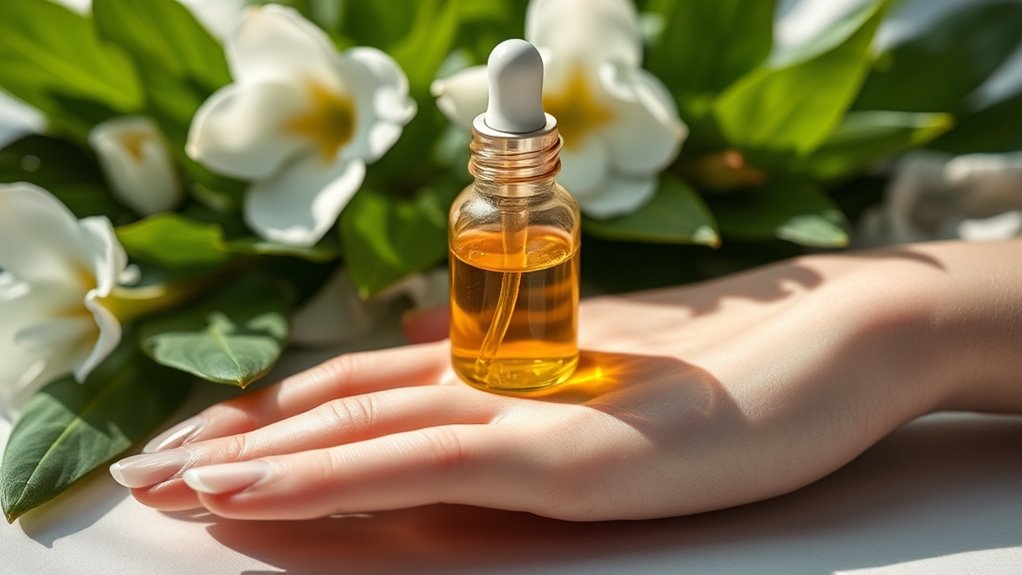These Oils Gave Me Softer Skin Without Breaking Me Out
Using facial oils can beautifully soften your skin without causing breakouts. Lightweight oils like jojoba and squalane hydrate effectively, while rosehip oil soothes inflammation. These oils mimic natural sebum, balancing oil production. Applying the oil properly enhances absorption—warm it in your palms, press it onto your skin, and focus on dry areas. Gradually incorporating the right oils tailored to your skin type can lead to impressive hydration and health. There’s much more to explore about their benefits and usage.
My Journey to Softer Skin
As you embark on your quest for softer skin, you’ll likely discover that the journey encompasses much more than just using lotions and creams.
One crucial element is incorporating facial oils for skincare. These oils not only hydrate but also balance your skin’s natural oils, preventing dryness and irritation. Choosing the right facial oils for various skin types is essential to ensure you get the most benefit without adverse reactions.
Why Facial Oils Work for All Skin Types
Facial oils can be surprisingly effective for every skin type, from oily to dry and everything in between. They provide essential fatty acids, which help to balance moisture levels and maintain the skin’s barrier. Additionally, oils mimic your skin’s natural sebum, reducing excess oil production in oily skin types while hydrating dry skin without causing breakouts. This versatility makes facial oils a wise choice for anyone. Furthermore, incorporating hyaluronic acid into your routine can enhance the hydrating effects of these oils, ensuring your skin stays plump and radiant.
The Best Oils for Hydration Without Breakouts
When you’re on the hunt for oils that hydrate without leading to breakouts, choosing the right ingredients is crucial.
Look for lightweight oils like jojoba and squalane, which mimic your skin’s natural sebum, providing moisture without clogging pores.
Additionally, rosehip oil contains essential fatty acids that soothe inflammation, while marula oil is rich in antioxidants—perfect for maintaining hydration. It’s important to consider your skin type when selecting oils, as different formulations can address specific concerns effectively.
How to Properly Apply Facial Oils
Finding the right oils for hydration is just the beginning; knowing how to apply them effectively can make a significant difference in their impact on your skin.
-
Cleanse your face thoroughly to remove impurities.
-
Warm a few drops of oil in your palms, activating its benefits.
-
Gently press the oil onto your skin, focusing on areas needing extra moisture. This method enhances proper layering techniques which can significantly improve absorption and overall efficacy of the product.
Tips for Integrating Oils Into Your Skincare Routine
Integrating oils into your skincare routine can significantly enhance hydration and overall skin health, provided you approach it with intention.
Start by selecting oils suited for your skin type; lighter oils work well for oily skin, while richer oils benefit dry skin.
Incorporate oils gradually, mixing them with your moisturizer or applying them last.
Always patch test new oils to avoid adverse reactions.
Additionally, remember that poor sun protection can accelerate skin aging, so using oils with added SPF or antioxidants can be especially beneficial for maintaining youthful skin.
Final Thoughts on Oil Benefits for Skin
Although the benefits of oils in skincare are often discussed, understanding their specific advantages and how they cater to diverse skin needs is crucial for anyone looking to improve their regimen.
-
Hydration: Oils lock in moisture, ensuring your skin remains dewy and plump.
-
Texture Improvement: Regular use can lead to smoother, more refined skin.
-
Barrier Support: They strengthen your skin’s protective barrier, aiding in overall health.
Moreover, incorporating treatment products into your nighttime routine can enhance the effectiveness of these oils, promoting increased skin vitality overnight.

